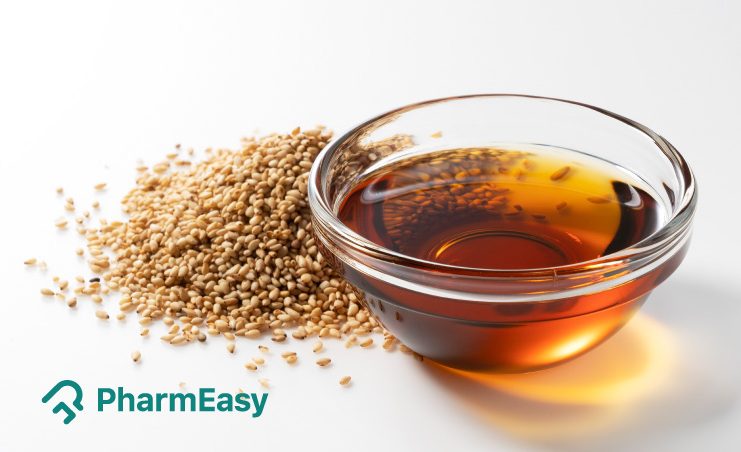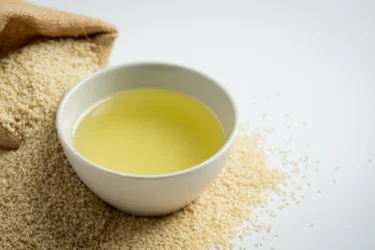Sesame Oil: Uses, Benefits, Side Effects By Dr. Rajeev Singh
By Dr Rajeev Singh +2 more

Get,

to manage your symptom
Get your,


4 Cr+ families
benefitted

OTP sent to 9988776655



You’ve successfully subscribed to receive
doctor-approved tips on
Whatsapp

Get ready to feel your best.

Hi There,
Download the PharmEasy App now!!


Register to Avail the Offer
Send OTPBy continuing, you agree with our Privacy Policy and Terms and Conditions

Hi There,
Sign up on PharmEasy now!!
Trusted by 4 crore+ families

OTP sent to 9988776655



You have unlocked 25% off on medicines




Code: NU25
By Dr Rajeev Singh +2 more
Table of Contents
We have many options for edible oils like sunflower, groundnut, and olive oil. One more oil, Sesame oil is one such example used for cooking. Sesame oil is obtained from the seeds of the sesame plant. The sesame plant seeds (Sesamum indicum) are packed with oil and nutritional components like vitamins, minerals, and polyunsaturated fatty acids (PUFA). Sesame seeds contain 45 to 50% edible oil and are used for culinary purposes. Because of this reason, sesame is also known as the “Queen of oilseeds”. Other names are gingelly, til and benne seed1. Even though, it is used for cooking, what if we told you there are other benefits of sesame oil? Yes, sesame oil might have more uses other than cooking! Continue reading to find out.

Did you know?
Sesame oil is a rich source of polyunsaturated fatty acids (PUFA) and natural bioactive compounds like sesamin, sesamolin, and tocopherol1. Other essential nutrients in sesame oil are vitamin K, omega-3 fatty acids, and lecithin2. The nutritional value per 100g of sesame oil3 is given below.
Sesame oil has many effective properties, and a few properties of sesame oil are given below:
Sesame oil is widely used in ointments that are used to relieve varicose veins. Due to its antioxidant properties, it might help in cell production. Additionally, it also exhibits anti-inflammatory properties, which might help in reducing inflammation5.
Dr. Siddharth Gupta, B.A.M.S, M.D (Ayu)
Due to its many properties, sesame oil might show potential uses for numerous health conditions. Some of the potential uses of sesame oil are given below.

Antioxidant activity is good for the human body as it may reduce oxidative stress. The oxidative stress in the body might be responsible for chronic diseases like cancer, heart diseases, and degenerative diseases. Sesame oil contains natural antioxidants like vitamin E, sesamin, and sesamolin. Because of these phytochemicals, Sesame oil may reduce oxidative stress due to its antioxidant property1. However, you need to talk to your healthcare provider before taking sesame oil for its health benefits. Do not self-medicate.

Sesame oil may contain polyunsaturated fatty acids (PUFA) and this PUFA might show anti-arrhythmic activity. It might reduce blood cholesterol and dilate the blood vessels. It might also prevent atherosclerosis (deposition of fats in the blood vessels) by lowering blood cholesterol. The anti-inflammatory property of sesame oil might also avoid heart problems. These properties of sesame oil might keep the heart healthy1. However, more data are required to support the use of sesame oil on heart diseases in humans. If you are suffering from heart disease, follow your doctor’s advice strictly. Do not self-medicate.

Sesame oil has been traditionally used for various ailments and studies have shown that sesame oil may help in healing skin burns. In addition, sesame oil has excellent emollient properties and may be used as a massage oil. The application of sesame oil to the skin might also help the healing of some skin diseases. In addition, the natural antibacterial property of sesame oil may fight against bacteria which cause skin infections1. However, if you are suffering from skin problems, consult a healthcare provider or skin specialist before using any natural remedies on your own.

In lab studies, sesame oil might show hypoglycemic properties in humans. The hypoglycemic property might manage blood glucose levels in diabetic patients2. However, more research is needed to support the use of sesame oil against diabetes in humans. Diabetes is a severe medical illness that requires strict adherence to a doctor’s advice. Before using sesame oil for its properties against diabetes, talk to your healthcare provider.

Consumption of sesame oil may avoid constipation by facilitating bowel movement and lubricating the intestine. It might also aid digestion by nourishing the good bacteria of the intestine. Sesame oil has also shown activities against intestinal worms like the Ascaris and tapeworms1. Still, in case of any stomach problem, you must meet with a qualified doctor and get a proper diagnosis and treatment.
Though some studies show the benefits of sesame oil in various conditions, these are insufficient. Therefore, there is a need for further studies to establish the true extent of the benefits of sesame oil on human health.
During winter, the use of sesame oil can give relief from nasal dryness and irritation caused by dryness. Many studies imply the use of sesame oil as a solvent for various drugs that are applied during bronchoscopy due to its stable, non-irritant, and neutral nature6.
Dr. Rajeev Singh, BAMS
Sesame oil is an edible oil that can be used in many ways. Some of the common ways to use sesame oil are given below.
You need to consult a qualified doctor before taking sesame oil or herbal ingredients. Do not replace or discontinue an ongoing treatment of modern medicine with an ayurvedic/herbal preparation without consulting a qualified doctor.
There is a lack of research on the side effects of sesame oil in humans. Therefore, if you experience any mild or significant side effects after consuming sesame oil, reach out to your healthcare provider immediately.
Also, before using sesame oil for its health benefits, you need to contact a qualified doctor or healthcare provider about the possible side effects associated with its use. It will help you make well-informed choices.
Also Read: Groundnut Oil: Uses, Benefits, Side Effects By Dr. Smita Barode
While using sesame oil, you need to take these general precautions:
Before using sesame oil for any health benefits, you need to contact your healthcare provider about the precautions associated with its use. It will help you avoid unwanted effects.
Also Read: Cod Liver Oil: Benefits, Side Effects By Dr. Smita Barode
During lab studies, sesame oil has shown interaction with a drug-metabolizing enzyme in our body, known as P450. However, more animal and human trials are needed to confirm this interaction4.
If you are taking medicines for any health condition, talk to your doctor about the possible interactions of the treatment with other herbs and drugs.
Also Read: Sunflower Oil: Uses, Benefits, Side Effects By Dr. Rajeev Singh
Sesame oil is a rich source of polyunsaturated fatty acids (PUFA), which might be good for the heart. Sesame oil may potentially fight against diseases like diabetes, stomach diseases, heart disease, and skin problems1,2. However, more research is required to support the use of sesame oil against any health conditions. Therefore, you are advised to talk to your healthcare provider before using sesame oil for any of these benefits.
Sesame oil is known for its soothing and healing properties on the skin. Sesame oil has excellent emollient properties. It might heal burn wounds on the skin. Sesame might also be effective against certain skin diseases1. However, you should talk to a skin doctor or specialist in case of any skin problems and diseases.
Sesame oil is packed with nutritional components. It contains natural antioxidants like vitamin E, vitamin K, sesamin, sesamolin, omega-3 fatty acids and lecithin1,2.
Applying sesame oil to hair might strengthen it and some scientific studies suggest that sesame oil might make the hair healthier and stronger1. It might also help maintain the colour of hair as well2.
Though there is some evidence suggesting the positive effects of sesame oil for diabetic people, more research is required to support the claims2. Therefore, make sure you follow all the dietary restrictions prescribed by your doctor.
Disclaimer: The information provided here is for educational/awareness purposes only and is not intended to be a substitute for medical treatment by a healthcare professional and should not be relied upon to diagnose or treat any medical condition. The reader should consult a registered medical practitioner to determine the appropriateness of the information and before consuming any medication. PharmEasy does not provide any guarantee or warranty (express or implied) regarding the accuracy, adequacy, completeness, legality, reliability or usefulness of the information; and disclaims any liability arising thereof.
Links and product recommendations in the information provided here are advertisements of third-party products available on the website. PharmEasy does not make any representation on the accuracy or suitability of such products/services. Advertisements do not influence the editorial decisions or content. The information in this blog is subject to change without notice. The authors and administrators reserve the right to modify, add, or remove content without notification. It is your responsibility to review this disclaimer regularly for any changes.
Comments

Leave your comment...
You may also like
Comments